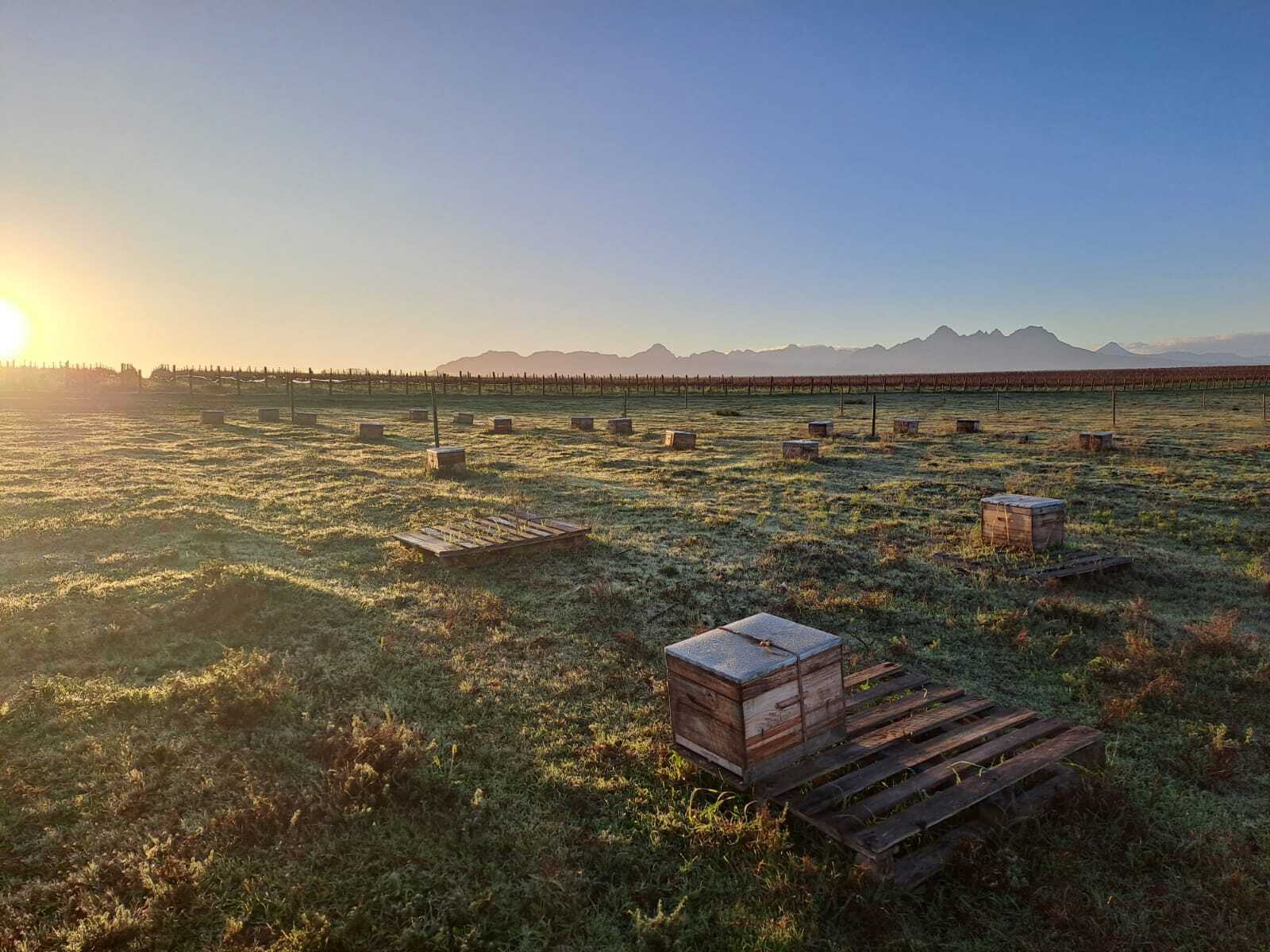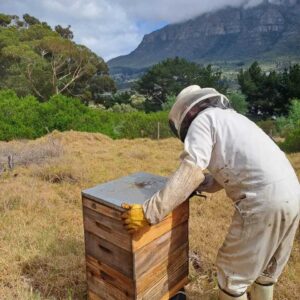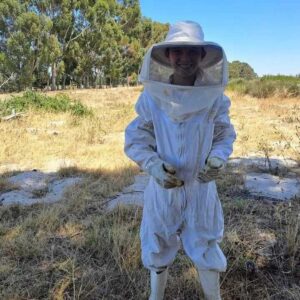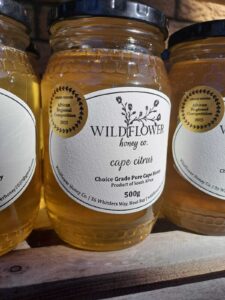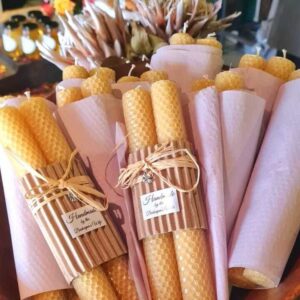Clayton and Roxy Sanders-Perrin’s Wildflower Honey won a special award for what judges believe could be the best honey in the world at two recent honey competitions, namely the Cape Honey Festival in Paarl and the Africa Apimondia Regional Conference in Durban.
At Apimondia, Wildflower Honey achieved the Special award as the Best Bottle of Honey among 152 entrants at the international symposium. It also won 1st prize in the Light Honey Category and 1st prize for Citrus Honey. This is a remarkable achievement as the couple became full-time beekeepers only three years ago and entered competitions for the first time this year.

Clayton and Roxy Sanders-Perrin’s Wildflower Honey proudly display the three awards they achieved at the Africa Regional Apimondia Symposium in Durban in March this year. (Source: Wildflower Honey)
Nature lovers
“I was born and bred in Hout Bay in Cape Town,” says Clayton. “Besides being very sporty, I have always had a love affair with nature and spent much of my youth exploring the Cape outdoors.”
Roxy, his wife, is a ‘farm girl’ from the northeastern parts of South Africa where she ran a cattle farm and managed sales and marketing of her family’s business, and she shares Clayton’s love for nature.
Big leap
Clayton worked in the rope access industry, which is the professional use of ropes to do inspections, maintenance, and other types of work, which took him to places around the world. “It was an exciting time in my life, but the best part of it all was always coming home to the Cape.”
In 2020, he took the big leap to leave his offshore career to invest all his time and money in Wildflower Honey.
“I wanted to be home with my family and work closer to nature. We have so much passion for what we do.”
Wildflower Honey
There is a lot of emotion invested in their business name, Wildflower Honey. “Roxy moved to the Cape during the month of August. She was so mesmerized with the sight of wildflowers popping up all over that she even had wildflowers tattooed on her back!”

Wildflower Honey’s logo was inspired by Roxy’s tattoo. (Source:Wildflower Honey)
Clayton wanted their business logo to be based on Roxy’s tattoo to give it a personal touch. “The resilience of a wildflower is inspiring and that is exactly what it takes to start your own business, especially with something that is affected by the elements of nature! “The same month the business name was officially registered, their daughter Isabella was conceived.
“She is most definitely our precious Little Wildflower!”

Isabella, Clayton and Roxy’s daughter, loves being a bee. (Source:Wildflower Honey)
Family-run business
The business is run by Clayton and Roxy. “I am Wildflower’s only beekeeper with the help of my right-hand man, Talent Mugumira, and occasionally our son Ethan pitches in to help during school holidays.”
Roxy focuses on sales and marketing and has started a side-line operation of, among others, beeswax candles and lip balms with the help of Elina Samati.

Clayton and Roxy Sanders-Perrin of Wildflower Honey with their children Ethan and Isabella. (Source: Wildflower Honey)
Following the flowers
At present, they have about 600 hives, but there will be more after the season’s splits. “The hives are based all over the Western Cape and we drive long distances to work them. I guess that is one of the challenges of beekeeping: the honey price has become related to the price of diesel!”
- Clayton runs 600 hives with the help of only one helper. (Source: Wildflower Honey)
- Clayton and Roxy’s son Ethan helps with the beekeeping during school holidays. (Source: Wildflower Honey).
They must also keep moving the hives around depending on the season and the available forage, which includes canola, ‘bloublom’ or Paterson’s curse, eucalyptus, fynbos, citrus, and a myriad of other flowers.
Fruits of the hive
They produce approximately ten tons of honey and about 300 kg of beeswax throughout the year. About 100 kg of propolis is harvested once a year. Most of the honey is sold to delis and boutique coffee shops in and around Cape Town.
Quality does not come cheap
Clayton believes cheap honey is never real honey. “Sadly, there has been an influx of honey from China, mostly pure glucose. We pride ourselves in our honey being pure, raw, and untouched.”
The couple hopes to educate people about the importance of buying real honey and supporting local beekeepers.
“It is vital that we protect our bees and grow their numbers. If we don’t have bees, we will starve.”
Bees need trees
Another pressing issue for beekeepers is the loss of foraging land. “With eucalyptus trees being cut down and some farmers using harmful chemicals, it has become increasingly difficult to find safe spaces for our bees. We have been very blessed to find ethical farmers who are happy to have our bees on their land. It is a win-win situation for farmers, the beekeeper and most importantly, the bees!”
Another issue is the ransacking and destruction of hives by honey thieves. “Finding a good site is one thing, but then there is also the issue of security.” Also, honey badgers that demolish hives for bee larvae are another threat. “However, this is a part of nature, and you must factor this in and write off the losses.”
Best bottle of all
“We have never, ever doubted the quality and pureness of what we produce, but we were absolutely overwhelmed when our honey won best bottle overall at The Cape Honey Festival, and, very hugely, at the African Apimondia Symposium. Being relatively new in the industry, this was really an immense moment for us,” says Clayton.
Elize Lundall-Magnison, a member of the Honey Judges Guild at the African Regional Apimondia Symposium, said Wildflower Honey’s Citrus Honey is delicious. “Reg Morgan, another judge, said it tasted like ‘real orange honey’, and I agree. It was a beautiful honey with a very light colour and a unique taste and aroma. It had a high density that would not easily crystalise.”
- “The colour and moisture content of the citrus honey are perfect, and the aroma is distinctly citrus without a hint of wildflowers,” according to beekeeper Louis van Zyl. (Source: Wildflower Honey).
- Besides honey, Wildflower Honey also produces wax products for sale in selected shops and farm stalls. (Source: Wildflower Honey)
Patience pays off
Clayton believes that when you work with nature, it works with you.
“There is also definitely something to be said for our Capensis bee – they are the master blenders of nectar!”
He also believes that it pays off to be extra patient when working with your bees. “I try to take my time when I work our bees. I am extra meticulous, paying careful attention to the little details in each hive.”
Pollination plans
Clayton and Roxy plan to put a lot more hives into pollination services this year. “We have had very fruitful results with our pollinations and have established good working relationships with our farmers. We hope to gain more pollination contracts as we are confident of our bees’ capabilities.”
Liquid gold
They also hope to get into more delis, coffee shops, gift stores, road stalls, boutique hotels, and the like.
“Our honey is so close to home; we are not aiming for a mass-produced market. We would rather have our special little bottles of ‘Liquid Gold’ be enjoyed by families around the country who appreciate knowing all the hard work that goes into every drop, for both beekeeper and bee.”
Next stop, London
They are also hoping for sponsors to assist them to get to the honey awards in London to compete against the world’s best.
“I think South African honey is just super special and we would love to be able to showcase our honey in London and make a positive impact for our country.”
Most of all, they want to play a role in helping to grow the South African honey industry by educating everybody about the values of pure honey. They also want to team up with organizations to donate hives and educate rural communities across Africa.

Clayton and Roxy all suited up to work with the hives in the family-run business. (Source: Wildflower Honey).
Mentors
Since Clayton always wanted to farm, beekeeping provides the opportunity to experience a farming lifestyle and work in nature. He has always been intrigued by bees and in 2018 started beekeeping as a “serious hobby”. “I got the opportunity to work under Brenden Ashley-Cooper, who has been my mentor from the start. Beekeepers like himself and Louis van Niekerk have been so generous with their knowledge and advice. I will remain forever grateful for all their freely shared wisdom.”
They are also thankful to Riette van Zyl and the rest of the team at the Western Cape Bee Association, SABIO, and the Honey Judges Guild for awarding them the opportunity to participate – and succeed.
For more information, contact Clayton and Roxy at wildflowerhoney2020@gmail.com or follow Wildflower Honey on Instagram and Facebook.

